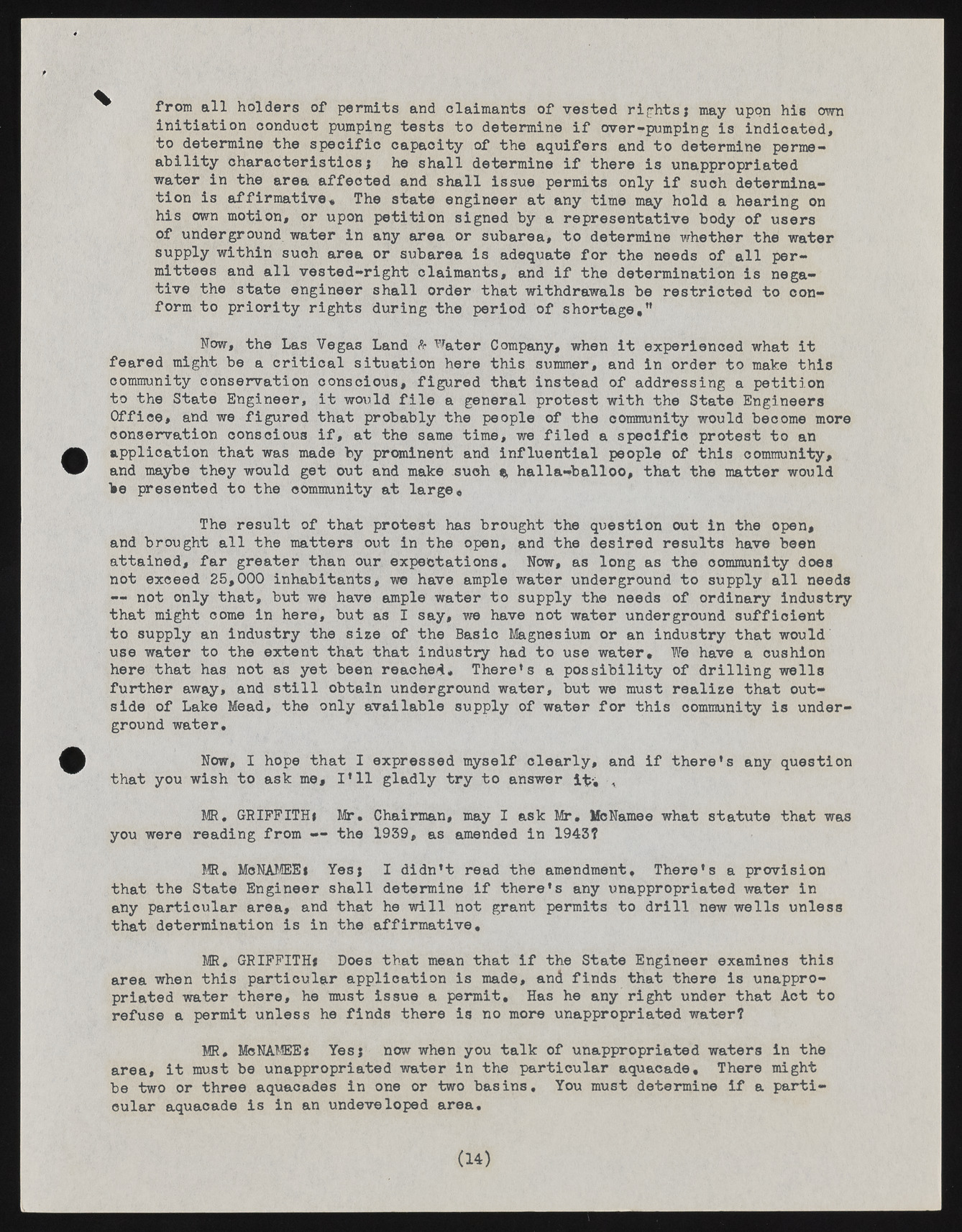Copyright & Fair-use Agreement
UNLV Special Collections provides copies of materials to facilitate private study, scholarship, or research. Material not in the public domain may be used according to fair use of copyrighted materials as defined by copyright law. Please cite us.
Please note that UNLV may not own the copyright to these materials and cannot provide permission to publish or distribute materials when UNLV is not the copyright holder. The user is solely responsible for determining the copyright status of materials and obtaining permission to use material from the copyright holder and for determining whether any permissions relating to any other rights are necessary for the intended use, and for obtaining all required permissions beyond that allowed by fair use.
Read more about our reproduction and use policy.
I agree.Information
Digital ID
Permalink
Details
More Info
Rights
Digital Provenance
Publisher
Transcription
from all holders of permits and claimants of vested rightsj may upon his own initiation conduct pumping tests to determine if over-pimping is indicated, to determine the specific capacity of the aquifers and to determine permeability characteristicsj he shall determine if there is unappropriated water in the area affected and shall issue permits only if such determination is affirmative. The state engineer at any time may hold a hearing on his own motion, or upon petition signed by a representative body of users of underground water in any area or subarea, to determine whether the water supply within suoh area or subarea is adequate for the needs of all permittees and all vested-right claimants, and if the determination is negative the state engineer shall order that withdrawals be restricted to conform to priority rights during the period of shortage,” Now, the Las Vegas Land fr Water Company, when it experienced what it feared might be a critical situation here this summer, and in order to make this community conservation conscious, figured that instead of addressing a petition to the State Engineer, it would file a general protest with the State Engineers Office, and we figured that probably the people of the community would become more conservation conscious if, at the same time, we filed a speoific protest to an application that was made by prominent and influential people of this community, and maybe they would get out and make such % halla-balloo, that the matter would be presented to the community at large. The result of that protest has brought the question out in the open, and brought all the matters out in the open, and the desired results have been attained, far greater than our expectations. Now, as long as the community does not exceed 25,000 inhabitants, we have ample water underground to supply all needs — not only that, but we have ample water to supply the needs of ordinary industry that might come in here, but as I say, we have not water underground sufficient to supply an industry the size of the Basic Magnesium or an industry that would use water to the extent that that industry had to use water. We have a cushion here that has not as yet been reached. There's a possibility of drilling wells further away, and still obtain underground water, but we must realize that outside of Lake Mead, the only available supply of water for this community is underground water. Now, I hope that I expressed myself clearly, and if there's any question that you wish to ask me, I'll gladly try to answer A MR, GRIFFITH! Mr. Chairman, may I ask Mr. MeNamee what statute that was you were reading from — the 1939, as amended in 1943? MR. MoNAMEEi Yes j I didn't read the amendment. There's a provision that the State Engineer shall determine if there's any unappropriated water in any particular area, and that he will not grant permits to drill new wells unless that determination is in the affirmative, MR. GRIFFITH! Does that mean that if the State Engineer examines this area when this particular application is made, and finds that there is unappropriated water there, he must issue a permit. Has he any right under that Act to refuse a permit unless he finds there is no more unappropriated water? MR. McNAMEE* Yesj now when you talk of unappropriated waters in the area, it must be unappropriated water in the particular aquacade. There might be two or three aquacades in one or two basins. You must determine if a particular aquacade is in an undeveloped area. (14)

